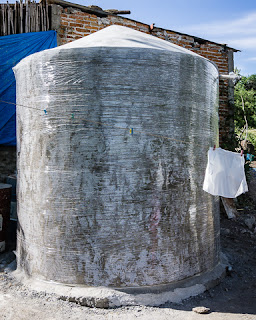Wrapping Up - 22nd Sept 2016
The cistern project in Salitrillo is well and truly
underway. The Pilot cistern at the home of Señora Cecilia Luna Rosas is
finished except for a curing period to set the concrete.
Meanwhile the second
cistern of eight which make up the first phase of the Salitrillo project is
just about ready for its “gorro” or roof. At this point, the build team of seven
women and two men are on their own except for weekly visits from Señor Abel,
the technical advisor from CEDESA.
This year the Rotary San Miguel Midday Club working
with the Rotary Action Group for Water and Sanitation (WASRAG) introduced an
innovation in the cistern construction process: plastic wrap!
As with any
ferro-cement structure, cement must be allowed to cure slowly to prevent
cracking and to attain its maximum structural strength. Normally ferro-cement
structures are “watered”, sprayed down with water on a daily basis, for a
period of days or weeks to make sure that the cement sets up slowly and remains
crack-free.
Needless to say this involves both careful attention to the
watering schedule and the use of water which is then wasted.
 Hence, the use of
plastic wrap. By wrapping the entire structure in a double layer of industrial
sized plastic wrap (think kitchen plastic wrap on a grand scale), the cisterns
wall and roof can undergo a slow curing period with much less care and feeding,
and with virtually no wasted water.
Hence, the use of
plastic wrap. By wrapping the entire structure in a double layer of industrial
sized plastic wrap (think kitchen plastic wrap on a grand scale), the cisterns
wall and roof can undergo a slow curing period with much less care and feeding,
and with virtually no wasted water.
Though
it may seem modest, it’s important to place Salitrillo’s cistern project in
perspective. The eight Salitrillo cisterns are among a total of 819 cisterns
constructed since 2008. Each cistern collects 12,000 liters of rainwater when
full. If you do the math, CEDESA and COCIRA, Project Beneficiaries and Rotary
San Miguel Midday have created an amazing above ground reservoir capable of
holding a whopping 9,828,000 liters of potable water storage.
Think about that
for a minute. 10 million liters is approximately 3 million gallons or roughly
four Olympic sized swimming pools of water captured each year for the drinking
and cooking needs of people living within the area of the Independencia
aquifer.
When
the current Global Grant is completed in the spring of 2017, a total of 1,092
cisterns will have been built representing an investment of over $10,000,000
pesos ($550,000 USD). Total rainwater collection capacity will top 13 million
liters. And the geographic area serviced by the combined Rotary projects will
include the communities surrounding San Miguel de Allende, San Diego de la
Union, Dolores Hidalgo and San Luis de la Paz.
Guest post by Roger Brudno.


 The pilot cistern was built at the elementary school. The
beneficiaries of the project agreed to teach an abbreviated form of the
education program to some of the students of the school & they were awarded diplomas as well.
The pilot cistern was built at the elementary school. The
beneficiaries of the project agreed to teach an abbreviated form of the
education program to some of the students of the school & they were awarded diplomas as well. Hence, the use of
plastic wrap. By wrapping the entire structure in a double layer of industrial
sized plastic wrap (think kitchen plastic wrap on a grand scale), the cisterns
wall and roof can undergo a slow curing period with much less care and feeding,
and with virtually no wasted water.
Hence, the use of
plastic wrap. By wrapping the entire structure in a double layer of industrial
sized plastic wrap (think kitchen plastic wrap on a grand scale), the cisterns
wall and roof can undergo a slow curing period with much less care and feeding,
and with virtually no wasted water.